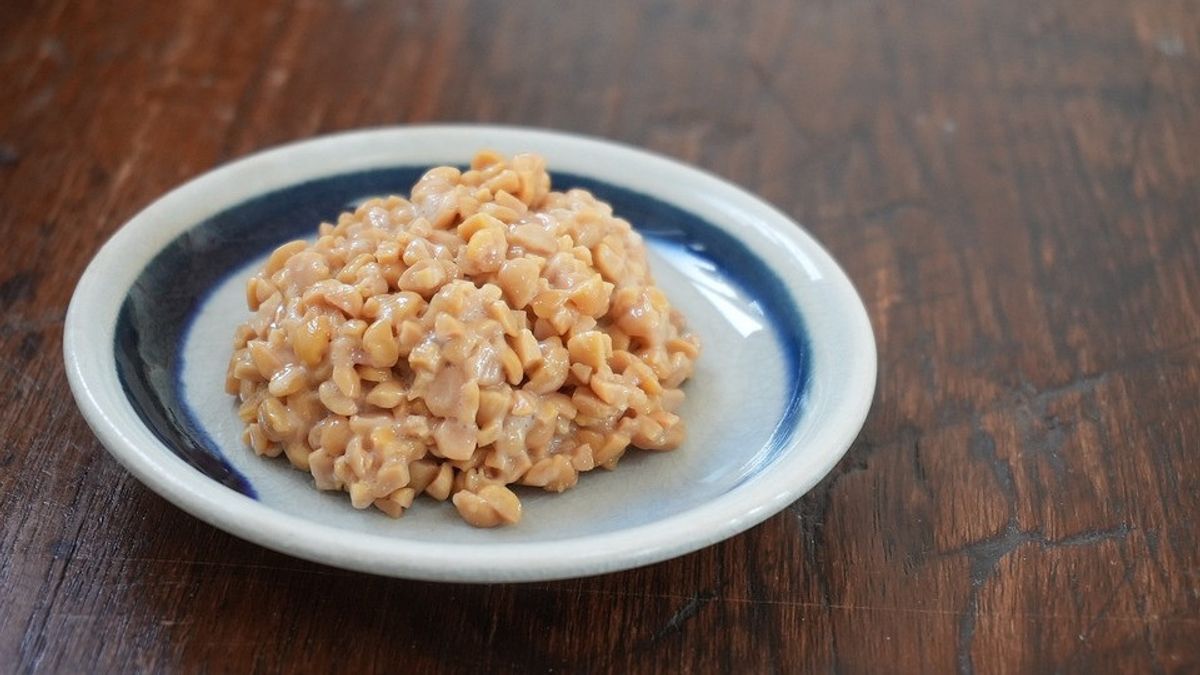YOGYAKARTA Some people may be wondering if natto is halal, given that the food is made of fermented soybeans and is considered to contain alcohol.
For those who don't know, natto is Japanese food whose texture is smooth, sticky, and fibrous. Its pungent smell makes almost everyone less like this one dish. Even so, natto had gone viral on TikTok and many social media artists tried out the food.
How is the Natto Making Process?
Quoted from Cultures for Health, the ingredients used to make natto are soybeans and the Natto Starter Culture package.
The process of making natto started by breastfeeding soybean seeds, and soaking them with 6 glasses of water for 9 to 12 hours. Furthermore, soybean seeds are cut from immersion water and put them in a large pot and then boil them for 2-3 hours.
The cooking process aims to facilitate bacterial sporacities to penetrate soybean seeds.
Soybeans that have been cooked, are then cut. Subsequently, soybean seeds are given natto-kin (fatto bacteria) containing subtilis Bacllus bacteria.
Soybeans that are given bacteria are then stored so that they can be fermented. When the color changes whiteness and smells ammonia, such as the aroma that comes from nuts, it means that natto has been fermented.
Natto is thought to have existed since the 10th century BC and the middle of the M-century. Natto began to be marketed as a product in the period Edo (1603-1868), until it finally became a traditional Japanese food.
In Sakura's country, natto is known as a healthy food because it contains many vitamins K, soybean protein, and food fiber.
However, because this food is fermented by bacteria and emits pungent odors such as the smell of alcohol, of course, it makes some people question the halalness of natto.
So, is Natto Halal?
According to the Institute for the Study of Food, Drugs and Cosmetics of the Indonesian Ulema Council (LPPOM MUI), not all fermentation processes can produce by-products in the form of alcohol, quoted by VOI from Kompas, Saturday, October 15, 2022.
Based on the MUI Fatwa No. 10/2018 concerning Food and Beverage Products Containing Alcohol/Etanol, it is stated that fermented food products containing alcohol/tahl are halal, during the manufacturing process they do not use illegal materials and if medically they are not dangerous.
This means that natto is halal food and can be consumed by Muslims casually.
Natto Aligned Critical Point
As mentioned above, natto is a food fermented by subtilis Bacclus bacteria.
Well, the media to grow these bacteria is one of the critical points of Natto halalness.
As stated by the Corporate Communication Manager of the Institute for the Study of Food, Drugs and Cosmetics MUI, Raafqi Ranasasmita, M. Biomed.
Traditionally, bacteria are taken from the remains of previous production. However, the manufacture could use microbiological media. The critical point of microbiological media lies in the nitrogen source, which can come from meat extracts, meat hydrolysis peptons, and other ingredients, said Raafqi.
He added that the origin of meat for the medium for making these bacteria needs to be traced whether it comes from slaughtered animals in accordance with Islamic law or not.
Not only that, but complementary spices that contain natto must also be considered, for example using alcoholic drinks or meat broths that are not clearly halal.
Please note, a number of Japanese cuisine often use sake and mirin in the manufacturing process.
If you want to eat natto, pay close attention to the composition of the ingredients. You can check the halalness of natto products online via the www.halalmui.org page.
That's information about whether natto is halal. May it be useful!
The English, Chinese, Japanese, Arabic, and French versions are automatically generated by the AI. So there may still be inaccuracies in translating, please always see Indonesian as our main language. (system supported by DigitalSiber.id)













